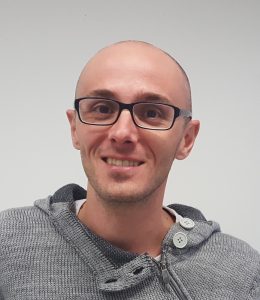Meet the Trainer – Paolo Ronchi

Meet Dr. Paolo Ronchi, scientist in the Electron Microscopy Core Facility (EMCF) at EMBL, which helps users answer their biological questions by developing strategies and workflows.
Paolo first joined EMBL in 2008 as a PostDoc to study the biogenesis of the Golgi apparatus after removal of this organelle from living cells by laser nanosurgery.
Why did you choose to become a scientist?
During my studies, I was always more interested in literature and philosophy. However, when I had to decide for a university subject, out of curiosity I opted for something different: a new biotechnology course had just been opened and I enrolled. Despite this accidental start, I now think that a scientific career has been a good fit for my critical and curious mind.
Where do you see this field heading in the future?
It is very difficult to foresee where the developments are going to bring us. A few years ago, due to the developments in fluorescence proteins and light microscopy techniques, probably not many people would have bet on a bright future for electron microscopy (EM). Now the field is more active than ever, with 3D EM and correlative light and electron microscopy being key to new discoveries in biology. In the near future, I am convinced that the goal of the EM community should be to advance our methods (from sample prep to image analysis) to a higher throughput, to finally make EM a quantitative tool.
How has training influenced your career?
Working in a facility and being highly involved in training, I experience daily how important courses are to disseminate knowledge and network with a community of experts. Furthermore my personal experience shows how attending a course can change your career, even many years afterwards. At some point during my PhD studies I realised I needed to perform some EM experiments. Therefore, I applied to the course on “Electron microscopy and stereology in cell biology”. It was a great experience, I learned a lot and, when I went back home, I could finally carry out the experiment that was missing for my thesis. In addition to this, I got to know many electron microscopists, including Yannick Schwab, who was a student of the course that year. I do not know whether the good memories of that time played a role in getting me a job when, 10 years later, I applied for a position in the EMCF at EMBL (which Yannick is now heading), but for sure it helped my confidence to start a new job.
What is your number one tip for people looking for scientific training?
Even though nowadays you can find all kind of tutorials online, I believe that attending a course in person is still key because of the networking possibilities that it gives. Getting the best experts to sit with you and think about your questions and problems is incredibly valuable. And when you go back home, you will remain part of a community that is in touch to share experience and tips.
If you weren’t a scientist, what would you be?
A professional cyclist 🙂
You are organising the EMBO Practical Course “Advanced Electron Microscopy for Cell Biology” (16 – 26 June 2020). What is the greatest benefit of the course for the scientific community and what could the techniques in this course be used for in the bigger picture?
I think this course is really unique in many aspects. First of all, hands-on practicals are not just demos by the experts, but the students also have the possibility to learn using their own samples. In addition, the almost 1:1 ratio between students and trainers gives everybody the chance to be trained individually at the level they need. It is not by chance that many leading electron microscopists of today have attended this course in the past.
Interested in this course? Apply by 24 March 2020.